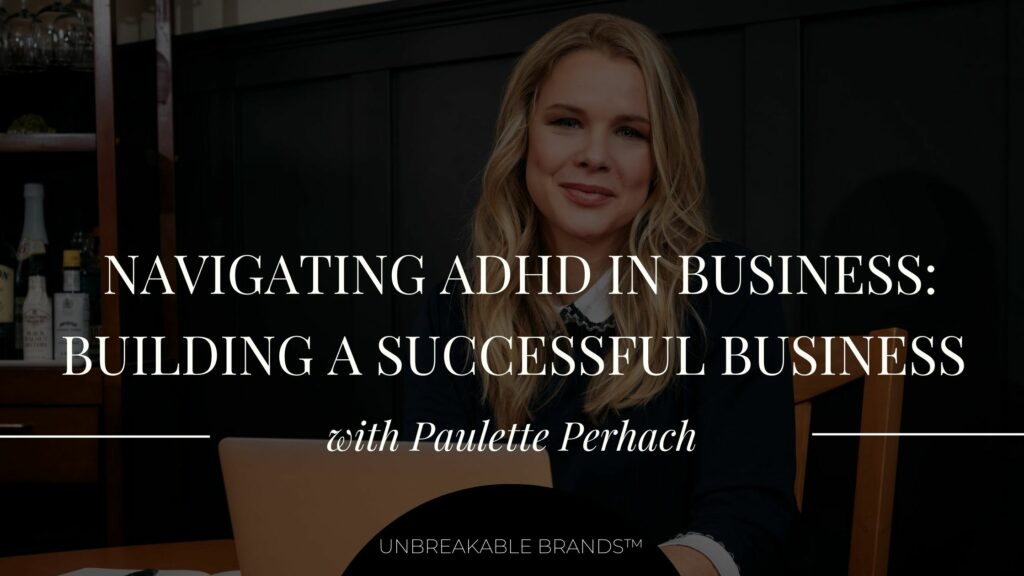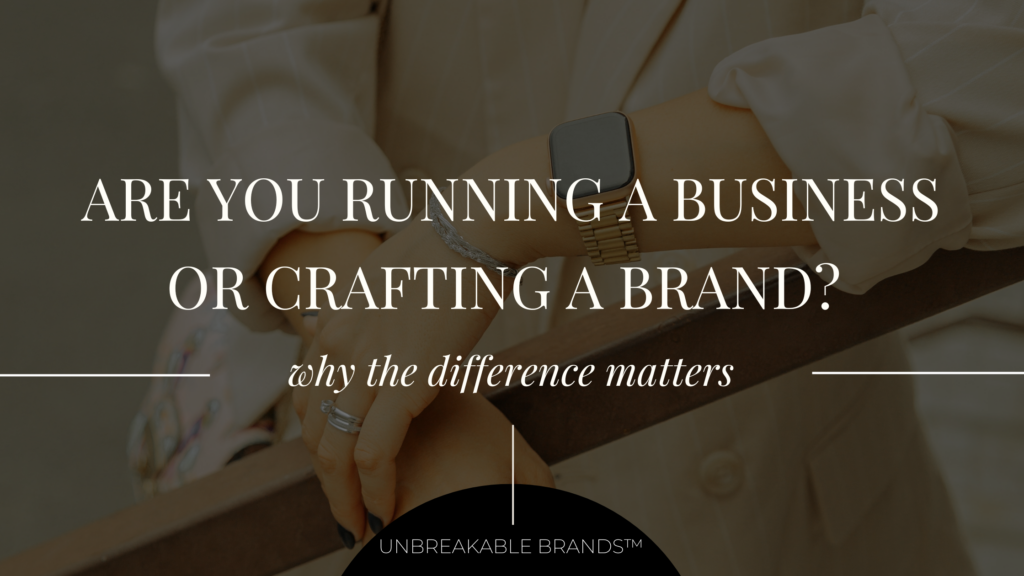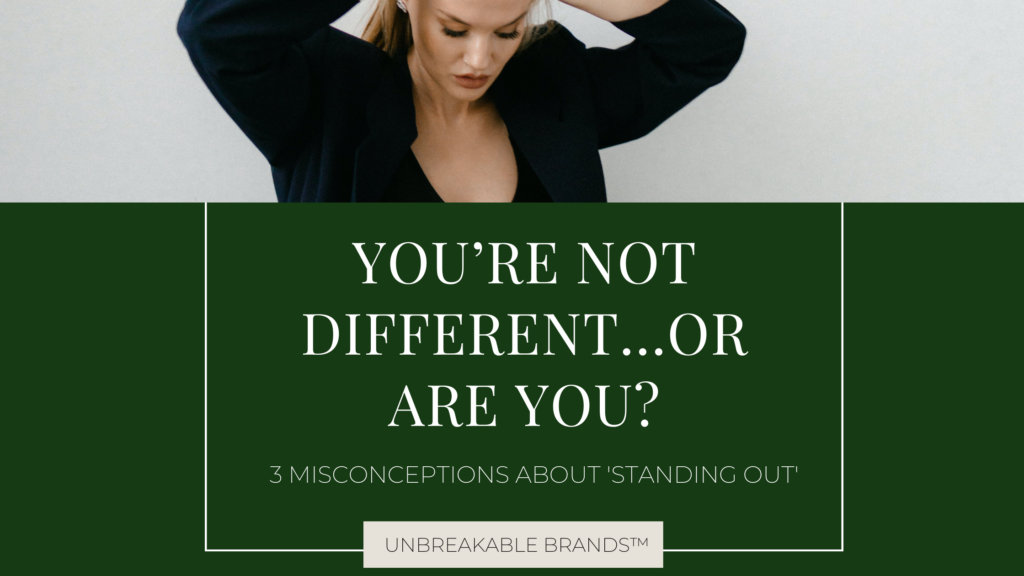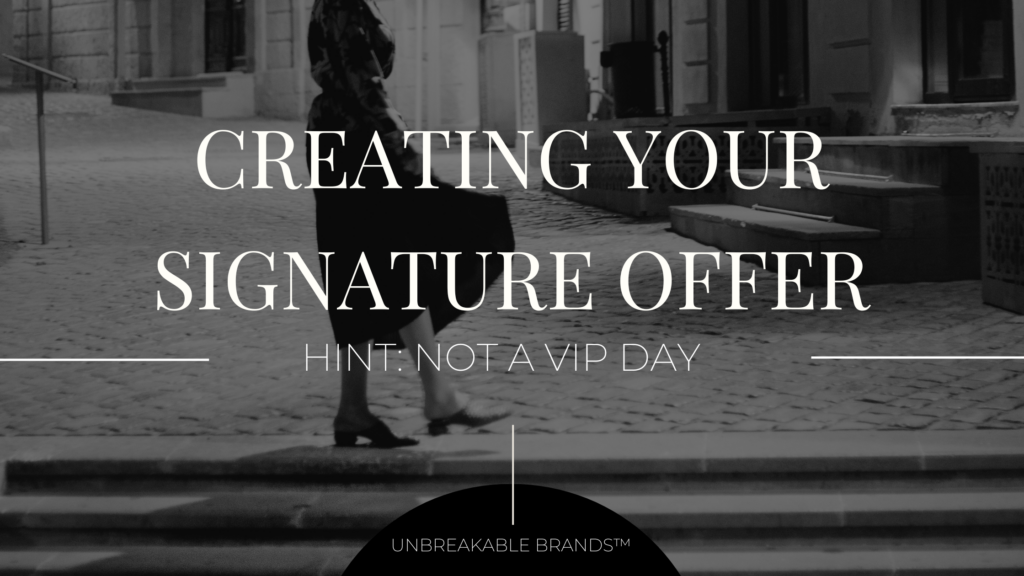Today we are going to be having a chat with Paulette, around navigating ADHD as a female founder.
Paulette Perhach is an author and writing coach with over 16 pieces in the New York Times and other work published in Elle, Vice, Marie Claire, Yoga Journal, and McSweeney’s Internet Tendency, with some of her work garnering two million-readers and becoming viral essays.
Her book, Welcome to the Writer’s Life, was selected as one of Poets & Writers’ Best Books for Writers. She continues to write about writing craft, business skills, personal finance and joy at WelcomeToTheWritersLife.com and is currently developing an app to support writers as they navigate getting published.
Welcome Paulette!
Here’s what you can expect to hear in this episode:
- Her journey as a writer and getting diagnosed with ADHD
- Asking for the help she needed in her business
- Misconceptions about ADHD
- Harnessing the strengths of ADHD and self-acceptance
- Her coaching business and the app she developed
Resources Mentioned In
This Episode
Tell me a little bit about how you, one, became a writer, and two, how you discovered you were ADHD, which is a more recent discovery.
So when I was growing up, my dad was an entrepreneur and we really struggled and I was like, just give me a corporate job, 100%. And then I turned out to be exactly like my dad and I just feel so strangled in a corporate environment and so icky is maybe the right word.
Like we’re all putting on a little play. Like no one really believes the words that are coming out of their mouths and no one really wants to say the words that are coming out of their mouths and I just couldn’t stand it.
It was like a background of feedback noise in my life all the time. And I just wanted to escape it. I really liked the paycheck really appreciated that and the insurance, but I decided to live the writer’s life and wrote my book Welcome to the Writer’s Life and have been building a business of writing and coaching ever since with, you know, this crazy mix of strengths and weaknesses.
You know, everyone says ADHD is a superpower, and I’m like, yeah, ADHD is both the superpower and the kryptonite. So really figuring out how to handle this like rumble of strengths and weaknesses and figure it out.
Things are really starting to get a little bit easier and things are working out and it’s feeling nice lately.
I didn’t get diagnosed until 2021. What’s wild is that in 2018, I was interviewing an expert on ADHD and we got to chatting just about distraction and stuff and he’s like, it sounds like you have ADHD.
I was just like, okay, let me check that out. He’s like, let me connect you with a center that you have there in Seattle. And I was like, okay, great, but the test was $250 and I was writing my book that year and I was working so hard and I was so broke working on this book.
So I was like, I don’t have that. So okay, we know that I’m just distractible or I probably have ADHD, whatever, no big deal. It wasn’t until two years later that I was like, okay, I’ve got to figure out what is going on with me.
So by that time the test was $320 and when I went to the center to get my test, I realized it was named after that guy who I had interviewed and he’s one of the foremost experts and I absolutely should have listened to him.
The guy who gave me my test was even kind of starstruck that I had talked to him. He was like, what’s he like? I was thinking, oh my God, I should listen to this guy.
So totally have ADHD and even just as recently as writing my latest story about ADHD and the struggles with personal I didn’t really realize what I was up against. It is just a whole thing. And so you have to take it seriously.
Was there a catalyst or a single moment in the two years where you thought it was time to take the test?
I think it was seeing that I was really working hard, I know I’m smart, things were going really well, and then also things were going badly.
It was probably a negative bank balance or something, and by that time I had hired my assistant, and I was like, okay, what isn’t working about what we’re doing right now? Why isn’t this all adding up to at least a positive bank account?
And so I said, let’s just check this off the list of it’s not ADHD, right? And then it totally was ADHD. And I think, we’re pretty sure my dad had ADHD as well, so that explains a lot of the struggles he went through.
It was so funny, we looked at the ad I had posted for my assistant and pretty much it just screamed, I have ADHD, you know? So yeah, it was really emotional to get diagnosed.
What are the things that you’re seeing on repeat that were big flags now that maybe you didn’t necessarily recognize until you were tested and started being aware them?
I think one of the ones that’s positive is this hyper focus. I mean, I almost went into jewelry making for my business and I could sit and make jewelry until my eyes were bleary.
And then all my jewelry supplies would get really disorganized because I would make jewelry until I was exhausted and I was too exhausted to put things away.
So making jewelry, I, you know, steam engined, just like chugging along, putting it away, all my beads and stuff, I was like, I can’t do it.
So then my supplies would get all messy and I’d get really mad at myself. And now in my business, when I have to make a new website or something I’m super into, I will just be so into it and my brain will just be like, this is all I wanna do.
I really respect that and I ride those waves. And if it’s something that I wanted to do anyway and it’s on my calendar, I just let myself do it pretty much.
So on the opposite side, when I’m really feeling that block, I try not to fight it unless I absolutely have to do it that day. And I’ll say, okay, I can really feel that I’m not feeling it because with ADHD you have an on switch and an off switch.
You kind of want to try to not fight either one of those unless you really have to. And if you do have to do something when you are just like turned off, body doubling is really helpful for that.
So body doubling, and what’s funny is, I had all these ways in which I was accommodating for ADHD without even realizing it, and I had different names for them because I had figured out that helps.
So I called them hand holding meetings with my assistant. I was like, I literally need you to get on Zoom and just hold my hand verbally while I do this. And how embarrassing for a boss to be like, please watch me do this or I can’t do it otherwise.
And then after my ADHD diagnosis, I learned that the term is body doubling and it’s that when there’s someone there with you, it makes it so much easier to do something.
What was it like having that conversation with your assistant and asking for that help?
I think that’s part of my arc in my change in my life was, oh my God, why can’t you do this? Oh my God, why do you need so much help? And then just being like, okay, I don’t know why, but I need help. I need more help. I don’t know why, but I’m not as good at life as everyone else.
And then it became, I don’t know why, but I need help, and I get it for myself. And having that self-compassion,
And then being able to be like, I do know why I need so much more help and I give it to myself and I don’t feel bad about asking for it. So luckily, I have a relationship with my assistant where I’m very comfortable with her and I think I also recognize my strengths.
I mean, I have written a book that has, you know, almost five star reviews on Goodreads and Amazon. I’ve written two articles, I’ve gone viral to a million people.
I know that I bring a lot of value into the world and I’ve helped a lot of writers be writers and just being like, I’m not a bad person because I struggle with X, Y, Z or things that are boring. And I’m not a bad person because I have ADHD.
So, I think when I first had that conversation, I would say, I just keep procrastinating on this. Can we just have a meeting together and just do it together? So you can just help me make sure that I get it done because I have so many other things on my brain.
Yeah, I think it would lose respect more from my assistant if I kept promising I would do something and didn’t do it, than if I asked her to sit with me and make sure it gets done.
Tell me a little bit about the misconceptions that you see within entrepreneurship about ADHD.
I think it’s that you don’t care. So I’ll give you an example. And this was really funny on my story about ADHD and women with personal finance recently. About half the comments were like, this is just an excuse, this isn’t real.
I recently had a situation in which it would have behooved me to have these details handled when I didn’t. So I realized that on my website, people who paid through Stripe, that money was not going into my bank account. It was going into a PayPal with an old email.
By the time I got in there, there was $5,800 in that account. It was like this found money. And I was like, this is so funny because, of course I wanted that money. Of course, right?
So I think it’s that you are just using this as an excuse and people don’t understand what it feels like in your body, you know? So it’s just really, really hard.
I saw one person say, oh, there’s an ADHD medication shortage. I guess you’ll just have to buck up and handle life like the rest of us. And I was like, do you know what you sound like?
If someone was like, oh, there’s a shortage on wheelchairs, I guess you’ll just have to buck up and handle life like the rest of us. That’s what you sound like.
So that it’s just this excuse, but there’s dopamine and there’s so many, you know, neurological things going on in the background that makes it so hard.
My friend, when I told her that, she was like, Paulette, and in that, like, Paulette was, you gotta do better, you have to care more, you know? I heard that and I was like, you know, I’m really doing my best.
Have your systems that you have in place shifted at all since your diagnosis?
I think people see my systems and they’re like a fence around a property, right? And people are like, wow, look at your fence. Like, ooh, that is tall, that is strong, that’s complex. You got a lot going on there with that fence.
And it’s like, that should tell you something about the animal that is contained inside. People didn’t pull up to Jurassic Park and they were like, is this a petting zoo? There’s a freaking dinosaur in there. So that is why so many, so many fences.
My primary diagnosis is that I have anxiety. And so a lot of people look at my calendar and they’re like, that gives me so much anxiety. It helps me really feel calm because part of what I do is I set out these time blocks where I say, okay, I know I have enough time to do this work because I have it scheduled here and here.
So my calendar, if you look at it, it’s almost like the principles of YNAB, which is the accounting software I like, where you give each dollar a job. I give each hour a job and I say, okay, that’s gonna be for this, this is gonna be for this. And then I just move the blocks around.
So people freak out because it’s full, but it’s full with things like meditation and my workout and my morning pages and a very important meeting which is the meditation and writing group that I work on.
So even though it looks packed, my morning is pretty pleasant and I spend it with myself and my writing, you know? So I don’t really start my workday until 11:30 in the morning, which, you know, even to me, I needed to kind of like remind myself like, hey, you have the whole morning for your self care.
So I think they haven’t shifted too much because I have built them with ADHD in mind. So I’ve pretty much kept those solid. I have things like a morning get it together, which is time where I have all of my banking pages in one folder.
So I just right click on the folder and I click open all and I check everything. I check my YNAB, my business accounts. I have something called the morning mix, which is every community that I wanna be in.
And again, I open all the tabs and it kinda works as a checklist. Like anything going on here I wanna comment on? No, close that. And then every Friday I have what’s called an executive meeting, which is where I go through 10 items that are kind of these bigger points of looking over my business. And that really helps as well.
It’s very much like my brand new water bottle here. This is how much water I have to drink every day. Simplified. It’s in one bottle, I fill it in the morning, I drink it, right? It’s not like, am I drinking enough water?
It’s just like, am I doing enough marketing? Well, yes, because every Friday, I do one pitch to teach a class or something like that. So it’s just setting down these recurring systems, which are really important to me and really helpful.
What did you discover in writing your piece when it comes to personal finance, especially for entrepreneurs or people who are responsible for maintaining everything or paying other people that work for them?
The biggest thing I think is realizing that I can’t do this alone. And you know, one of my experts was like, my wife handles my finances. I was like, great. What if your partner also has ADHD or you don’t have a partner?
So I started looking into ADHD personal finance coaches, groups, and things like that. I think the biggest impact was not to underestimate what you’re up against because if you do, you’re gonna keep failing.
And if you’re wondering, why do I keep failing? I mean, I always say with being a freelance writer and a software founder at this point, it’s so hard. And then it’s hard on top of a hard level, which is ADHD.
So just being really serious about it and not using ADHD as an excuse, but as a reason why you are so much more intentional than you might otherwise need to be.
What are some of the strengths you have noticed of ADHD and how can you harness them, especially as a woman?
I think it’s your ideas and your spirit, right? My two guiding principles for my business are that I make being a writer more fun and easier and I make things fun because as someone with ADHD, I wanna be entertained. I don’t like boring stuff.
I was really inspired by this Kaplan software that I used in high school to study for the SAT because I knew I needed to get a good SAT score. They made it into like a fun little game and it really helped me study for the SATs and keep at it.
So that’s something that I bake into my business and I think that’s a real differentiator for my brand is how much fun we try to have. And because I don’t like confusing or boring stuff, I’m really good at making processes and projects easier for people.
So I can really see how like, okay, this is just kind of a lot, let’s shorten this up or let’s make this easier. So really just thinking about your ideas and how you are just this fountain of creation, really, and just creating all the time.
Then you just need help to corral that into what makes the most sense to be doing.
Do you tell clients and the people you are working with that you have ADHD and what does that conversation look like?
I don’t often tell clients until we’ve been working together, maybe a little bit. But I do make sure that everyone who works with me as part of my team understands that. I think that believing in the strengths as much as the weaknesses really helps with that conversation.
So, I just say, there’s a way in which I can’t lead. And I think there’s a way in which every leader has a blind spot or can’t. For example, the introverted leader can’t be the cheerleader and the rah-rah and the keeper of this incredible spirit. I can do that. I love getting people excited and talking about big ideas. That is the way in which I can lead.
So really just putting the blind spots out front and center and saying, I really need help keeping up with systems. It’s so funny, I love system design and then really need help continuing that.
So they understand that that’s more and more of their job description and just setting that expectation up early
And also coming to it with gratitude and being like, I am so thankful because for five years I did it all by myself. And I’m just saying, I’m really, really grateful that I have so many people around me who I trust and who are amazing at their jobs and help.
The other thing is understanding that we function in a high trust environment, which is something I learned about from The Speed of Trust, which is an amazing book. And if you have a high trust environment, you don’t have to go around checking everyone’s work.
I’m not gonna go around checking everyone’s work. And so, I hire contractors and everyone is kind of their own intrapreneur if you will. It’s just, you come here and you do a great job and I believe that you do a great job and I don’t have the desire nor the ability to go around checking your work all the time.
Can you tell me more about the role of self-acceptance when it comes to your diagnosis?
I remember the day I got diagnosed. I had the meeting at 2 p.m. and then had my little schedule filled up afterward. And I got there, the guy was like, well, we don’t often get 20 out of 20. And I was just like, hmm, okay.
And then I need a minute afterward. It was a lot more emotional than I thought. I think part of the grieving was grieving those nearly 40 years where I thought I could just yell at myself about how bad I was at life or, you know, to self-berate my way out of it.
And then being like, oh, that was all really for nothing and that was all kind of pointless. It helped me to read the book, The Willpower Instinct. I mean, always trying to read the next book and trying to figure it out and trying to do all these things.
It’s been so much work for me to try to make life function. Because I have big dreams and I don’t want a mediocre experience or a mediocre life, and I’m willing to work hard for it. But like I said in my article, I am the construction worker and the arsonist and the firefighter.
So it just feels like these, especially with personal finance, just feels like these waves. So, one thing that Amanda Klayman said to me, who’s a financial therapist, who I’ve partnered with on a few things and interviewed her quite a few times, is yelling at yourself about something is just more time where you’re not figuring out how to fix the problem.
And I was like, ooh, girl, right? And so I think with that diagnosis, and anyone who’s on the fence about getting diagnosed, just take the test. It was such a game changer for me, like cannot be underestimated how important it was for me to see that.
Then what you do as well is you get plugged into the community. And the last interview that is in my piece was so poignant for me. And this ending quote, I remember every time I got the edit back, I would scroll down to the end and make sure they kept that ending quote.
Because I was like, I will cling to this ending quote with all my life and you’re not allowed to say she said at the end of it, this is what the story’s gonna end on.
She said something about how she got in all these groups and she met all these other women and heard the same story over and over and she said, so maybe I’m not as bad a person as I thought I was. And it was just, so brutal.
So yeah, let’s accept who we are, which is really hard, because the world doesn’t necessarily accept who you are. I think that’s kind of the community piece and the education piece is really important. There’s a lot of great books.
My mom actually said to me, you talk about ADHD a lot. And I was like, oh yeah, the neurodevelopmental disorder that I didn’t know I had for 40 years that ruined a lot of shit and caused a lot of pain and torment throughout our entire family?
Like yeah, I do. I’m figuring it out. I know a lot about it because it’s trying to ruin me. And so yeah, I talk about it a lot. And I talk about it with other people and I think it’s really important to discuss it and to be very open with it.
I knew someone who didn’t tell his work that he had ADHD and I was like, wow, that’s a choice. But I think it’s totally fine to just be out there and tell people about it and point out where you’re struggling, be like, well ADHD moment, and then just like, let’s get back, right?
Can you talk a little bit about your writing and your coaching and your amazing app?
I wanted to dedicate my work life to helping writers really make sure that they’re living the writing life they want to have. So I have a few different ways that I do that.
One is called A Very Important Meeting and it’s a daily meeting where I lead a mindfulness meditation to help people focus and then we write together for 45 minutes and man, Emma Patti just sold a book that she worked on in there which was so exciting and I was really happy.
I am reading the first draft of my novel, which is almost done, so that is an amazing community.
My coaching, I have one-on-one coaching where I help people make progress on projects by having the accountability of, you’re bringing this into Paulette and you’re reading it out loud to her. We work together for three months and that’s called Your Personal Editor.
And then I have a group coaching program for freelance writers called Powerhouse Writers where I help freelance writers really figure out how to set a solid business foundation for their freelance writing business. That is a three-month program as well.
It’s really great to kind of meet other people and have that community in there to be able to talk with each other.
Then my software is called the Writer’s Mission Control Center. And that is one place where you can store everything you need to make your writing life happen. All your contacts, all your ideas, and your stories, and then how you can manage your submissions and your opportunities as well.
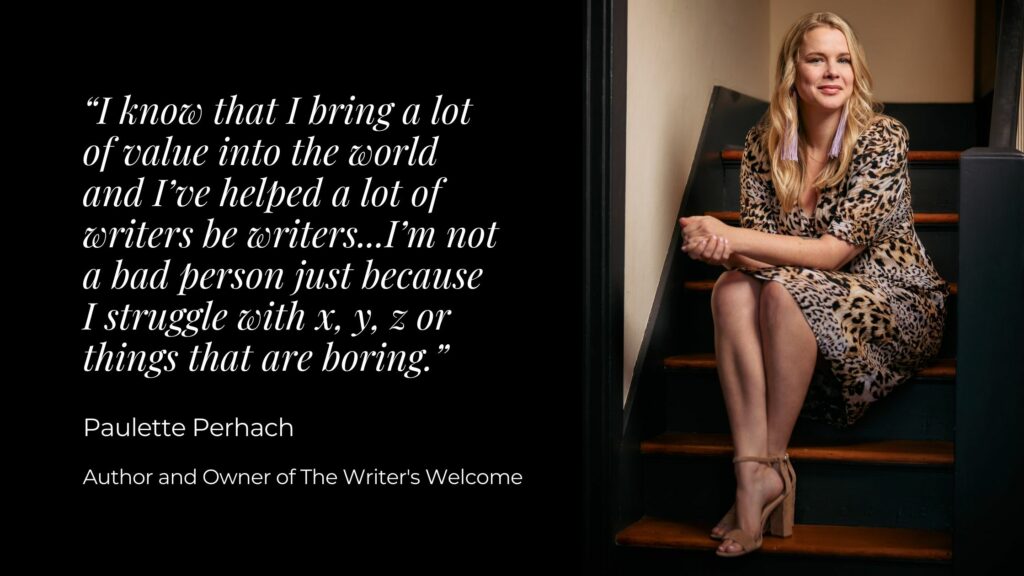
Speaker Bio
Paulette Perhach’s writing has been published in the New York Times, Vox, Elle, The Washington Post, Slate, Cosmopolitan, Glamour, Marie Claire, Yoga Journal, McSweeney’s Internet Tendency, Hobart, and Vice. She’s the author of two million-reader viral essays.
Her book, Welcome to the Writer’s Life, was published in 2018 by Sasquatch Books, part of the Penguin Random House publishing family, and was selected as one of Poets & Writers’ Best Books for Writers.
She blogs about a writer’s craft, business, personal finance, and joy at welcometothewriterslife.com and leads meditation and writing sessions through A Very Important Meeting.
She serves writers as a coach, helping them figure out how to make a life and career out of being a writer while making the money work (as she figures it all out herself.) She’s also a speaker on the topics of creativity, writing, and business.
Hugo House, a nationally recognized writing center in Seattle, awarded her the Made at Hugo House fellowship in 2013. In 2016, she was nominated for the BlogHer Voices of the Year award for her essay, “A Story of a Fuck Off Fund,” which is anthologized in The Future is Feminist from Chronicle Books, along with work by Roxane Gay, Mindy Kaling, Chimamanda Ngozi Adichie, Caitlin Moran, and Audre Lorde.
In 2021, she was selected as a Jack Straw Fellow. In 2022 she celebrated a nomination from Barrelhouse for Best of the Net. Her work has been included in round-ups from Memoir Monday, the Aspen Institute, and Girlboss.
She shared the honor of a 2021 Washington State Book Award for the anthology Alone Together: Love, Grief, and Comfort in the Time of Covid-19 as a contributor.
After a decade in Seattle, she moved across the street from her best friend back in Florida.

